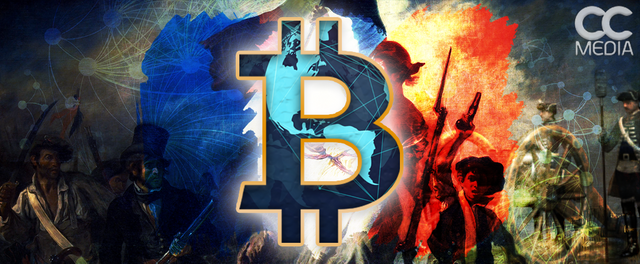Drawing Parallels between the French Revolution and the Cryptocurrency Movement in Developing Countries

Failed and Outdated Systems, Insensitive Leadership, Frustrated Populace
The 1789 French Revolution came about as a result of a people frustrated with the state of affairs at the time. The years preceding the revolution were characterized by dire economic conditions, poor weather, and poverty. The ruling class was however insulated from the hardship and continued to live lavishly without paying much heed to the problems of the general public. David Graeber, wrote about a different time in his book, “Debt, The First 5000 years.” Graeber covered the third world debt crisis of the 1980s. Once again, insensitive leadership created an economic mess in a number of developing countries. Structural adjustments had to be made to ensure loans that were mismanaged by political leaders were paid back. In a classic partnership of the elite of the developing and developed world, the ordinary citizens in the developing world had to suffer the burdens of austerity measures. This too, led to political instability in a number of African countries especially. The debt crisis as well as other economic problems continue to plague the developing world. This is a look at the ways in which cryptocurrencies can be used as tools to bring about economic freedom in the developing world by making comparisons and drawing lessons from the French revolution.
Replacing Failed Systems with New Ones
Revolutions have always been acts of the people to bring about radical changes to the prevailing order of the time. The motivation for a large group of people to make potentially dangerous acts of defiance usually stems from deep-seated frustrations about the status quo. Simply explaining to people how a better financial system could be built on cryptocurrencies like Bitcoin is not enough to get everyone to rally behind the course. Perhaps, this explains why it is in countries facing hyperinflation that cryptocurrencies are used out of necessity.
Luckily, unlike the French Revolution, the cryptocurrency movement does not have to be a bloody one. Instead, it requires all involved to use the technology, educate others, help build applications and grow the ecosystem. Most importantly, there would have to be new ways to overcome restrictions that might be imposed on the growth of the technology by the current system. The requirements are the same for developing countries. To be free, people in the developed world can use cryptocurrencies to perform tasks they could otherwise not get done easily. Such tasks could be sending funds across borders or simply storing wealth.
Forks in the Road
Revolutionists in the French revolution did not always agree. There were opposing voices when it came to declaring war on Austria, pronouncing the death penalty on King Louis XVI and the use of terror to control society. In the world of crypto, we have had different cryptocurrencies created to perform functions other than that of Bitcoin.
Bitcoin itself has been forked a number of times due to the failure of groups with different interests to agree on the way forward for the technology. Luckily, the forks have not necessarily weakened Bitcoin itself. Forks other than Bitcoin Cash were not contentious but were just a means of taking the technology in other directions. For instance, Bitcoin Gold focused on decentralizing mining by disallowing specialized miners while Bitcoin Private focuses on privacy using technology borrowed from Zcash.
The varying ideas on how cryptocurrencies should work and what they should be used for are not necessarily bad for the movement. The most important thing is to keep an eye on the broader goal of financial freedom for all. This means the developing world is also free to partake and use cryptocurrencies in any way that would be beneficial to them.
Avoiding the Excesses of the French Revolution
As mentioned earlier, the cryptocurrency revolution does not have to be a bloody one like the French Revolution. Another way in which the cryptocurrency revolution can get out of hand and lose focus is by only concentrating on making money. Just like the majority of people are unlikely to act until conditions become extremely bad, most people are unlikely to participate simply because it’s for a good course. Money, however, serves as a good motivating factor.
The opportunity to get rich has been a good incentive to join the cryptocurrency community. It has also attracted many unscrupulous individuals. As a result, scams and hacks are not in short supply.
There is also the issue of businesses in the ecosystem focusing only on creating wealth for their shareholders without considering the wellbeing of the cryptocurrency community and its broader goals. If cryptocurrencies are going to be successful, such actors in the community would have to be in the minority.
We can liken the ongoing cryptocurrency revolution to the tearing down of the Bastille brick by brick. The attempt to bring about change in the existing financial system can be compared with the end of monarchy in France by the French revolution. Cryptocurrency enthusiasts and aficionados should be on guard to ensure that the goals of financial freedom and inclusion are what continue to be the focus of the community. This way, the cryptocurrency movement does not only become a means of enriching a few people but a means of bringing about real change. This change spoken of is much needed in the developing world.
Posted from my blog with SteemPress : https://cryptocoremedia.com/drawing-parallels-between-the-french-revolution-and-the-cryptocurrency-movement-in-developing-countries/
Please Upvote➜https://steemit.com/christianity/@bible.com/verse-of-the-day-revelation-21-8-niv